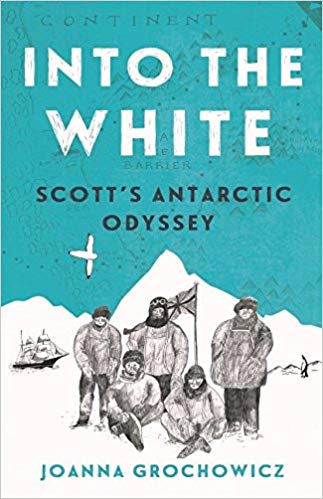BooksforTopics Reading for Pleasure Recommendations
Today we feature Into the White, a history-based chapter book charting Scott’s expedition to Antarctica.
Read on for a review of the book by a Review Panel member who recommends using the book with a Year 6 class, followed by an exclusive guest post by author Joanna, who discusses how learning about the past can give history the role of a ‘life coach’.
Book Title: Into The White: Scott’s Antarctic Odyssey (available here)
Author: Joanna Grochowicz
Publisher: Sarah Lippett
Publication Date: 2017
Most Suitable For: Year 6+
Reviewed By: Hayley Warner, Assistant Headteacher
This story tells the tale of Robert Falcon Scott’s Expedition to Antarctica in attempts to be the first to reach the South Pole. This expedition – The Terra Nova – is told in detail in the story, including the stories of the men that followed him. The very first sentence, ‘If you’re into happy endings, you’d better look elsewhere,’ is an instant hook and sets a precedent for what may come.
Though it is a narrative, there are true facts that run throughout the book that would would keep any reader gripped. Joanna Grochowicz creates suspense by referencing the constant threat to Scott’s party throughout, be it the freezing temperature, changing landscape, killer whales or the dreaded scurvy. There is also a possibility of a Norwegian expedition team beating Scott and his men to it. As a reader, you are willing for them to achieve their goal, but will they make it?
At the beginning of the book there are illustrations of the men which show each of their individual attributes as well as drawings of the area which map out their quest. These traits are mentioned often throughout the book and play a huge part in Scott’s final decision of the men that will accompany him to the South Pole. This book also has an element of surprise half way through: actual photographs taken from the expedition. These would make for a fantastic discussion tool in any history lesson about Antarctica or Scott and really give an insight into the harsh conditions the men faced daily.
This book would make for a great reference tool when learning about the different polar regions and Scott as one of the great British explorers. There are many chapters (55 to be exact) but they are short and very easy to read through. Scott’s previous expeditions are also mentioned, including the expedition with Earnest Shackleton.
I would recommend this book be shared with year 6 children to be used with regards to developing their understanding but not necessarily as a class text. The threat of peril may be too much for some primary aged children, especially when Scott and his four men begin to lose hope. However, the first few chapters are fantastic at describing the journey on board the Terra Nova which could inspire some detailed suspense writing.
Curriculum Links: This book would link perfectly with any study on the Polar Regions and great explorers.
You can order Into the White online or from your local bookshop or library.
——
Author Guest Post
by Joanna Grochowicz, author of Into the White
History as Life Coach
It’s an interesting question – or rather, it is interesting that a young person always asks it at the end of one of my school talks: ‘Did this really happen?’
To be fair, the story is unbelievable. Why would a group of men walk for months through a frozen wasteland, suffering the most intense mental and physical privations, hoping to reach a spot on the globe devoid of features, all the while knowing that success is highly uncertain? And yet, that is what Captain Scott and a group of tireless adventurers did a little over 100 years ago.
History offers countless examples of audacious quests, events that determined the fate of nations, triumphs and disasters that created or destroyed reputations – all fascinating stories that remain, for a variety of reasons, inaccessible to today’s young readers. Good quality narrative non-fiction can offer, even very young children, an immediate experience of history with fast-paced action, abundant dialogue and character focused storytelling to convey, what are often, relatively complex ideas and information. In many ways it’s education by stealth. But perhaps its real value lies in its potential for bringing the human experience of historical events to the fore.
Captain Scott’s story does not end well. Failure and death await the four men who accompany the Antarctic explorer on his quest for victory at the South Pole. But despite this, it remains a story that captures the imagination, one that celebrates the power of friendship, determination and human courage to venture into the unknown. To be sure, the story takes place at a time when patriotic zeal and a desire to stake a claim for king and country were the primary motivations for adventuring. Not such fashionable concepts these days. But if we look beyond that, we see that Scott’s story is compelling because it speaks to those qualities that are most relevant to young people today: resilience, teamwork and curiosity about the world.
As parents we are constantly reminded that social and emotional skills are becoming increasingly important and not just as an adjunct to academic learning and technical skills but in their own right. We may not know with any certainty what jobs our children will be doing in the near future but by equipping them with the so-called soft skills needed to cope with complexity and uncertainty, we can help prepare them for the unknown.
I believe strongly that books about real people undertaking things that are hard, dangerous and unsure is important for children’s social and emotional development. Certainly we should not shy away from exposing children to stories where failure is a possibility or an inevitability. Failure can be good, a springboard for improvement, refinement and excellence. Sadly not in Captain Scott’s case!
As a mother I want my children to develop tenacity – the ability to get things done in the face of obstacles. I want them to understand and care about other people and discover the pure joy of camaraderie that comes when working as a team towards a single goal. Mostly, I hope they will discover an insatiable curiosity about the world and an openness to new ideas – an adventuring mindset. These are relatively hard things to teach. They must be acquired. It may take them years of trying and, sadly, failing plenty too. But providing them, in their childhood years, with an understanding what these qualities look like in the real world will, I hope, set them on the right path to developing effective strategies to practice them. History can be a wonderful life coach!
For more from Joanna, visit joannagrochowicz.com.
———–
You can order Into the White online or from your local bookshop or library.
Many thanks to the Joanna for sending us a review copy of the book and writing the blog post, and also to Hayley for reviewing the book for classroom use.









